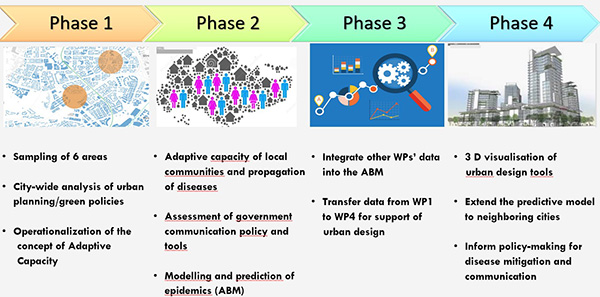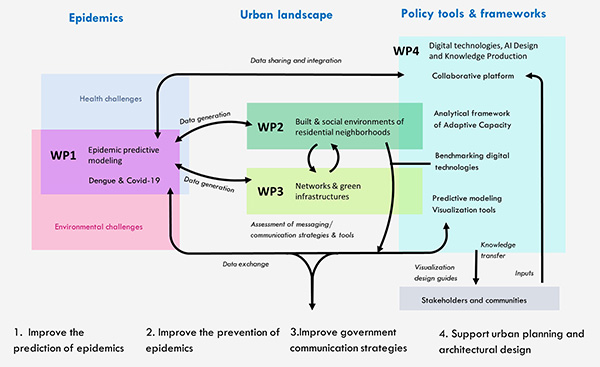SPACE 2021-2025
 (Olivier Telle, IRASEC researcher)
(Olivier Telle, IRASEC researcher)
Olivier TELLE participates to the SPACE project by directing the work package 1, “Predictive Epidemic Modelling”, with Alex COOK (NUS, Singapore).
The SPACE 2021-2025 project (NRF funding, Singapore, 3M euros) is based on a dynamic, adaptive approach to urban sustainability. It draws on analyses of the risk factors and socio-spatial patterns that drive dengue transmission in Singapore, as well as the social and technical skills developed by individuals, community groups and state actors in response to the spread of the disease. The project will use the concept of “adaptive capacity” (AC) to explore the potential of community-based “latent social capital” as key assets for adaptive responses to dengue-related health challenges, in interaction with COVID-19, as part of Singapore’s Smart Nation initiative. Olivier Telle is in charge of Workpackage 1, which aims to retrospectively analyze the risk factors associated with the emergence of dengue fever in Singapore, while modeling this risk in Southeast Asia (Laos, Thailand, India).
The SPACE project is developing a research protocol for infectious disease prediction and prevention in Singapore. The project draws upon analyses of the risk factors and sociospatial patterns that drive dengue and COVID-19 transmission in Singapore, as well as the social and technical skills developed by individuals and community groups in response to disease propagation. Combining insight from the social sciences (geography, architecture and urban design, communication, economics, sociology, public policy) with biology (epidemiology, entomology) and computer science (artificial intelligence, biostatistics), the project will use the concept of “adaptive capacity” (AC) to explore the potential of community-based “latent social capital” (i.e. human, cultural, political, and social) as key assets for adaptive responses to health challenges related to dengue in its interplay with COVID-19.
The SPACE project’s outcomes are to :
- Improve the current spatio-temporal epidemic forecast frameworks.
- Develop innovative policy ideas to enhance disease prevention and mitigation.
- Improve government messaging strategies and tools.
- Provide data visualization to assist urban planning strategies.
WORK PACKAGE 1 : Predictive Epidemic Modelling
WP1 aims to build and significantly expand on infectious disease modelling work done in Singapore. We will use Singapore as the primary case study due to the availability of fine-scale, high-resolution spatio-temporal disease data. Furthermore, with a climate and connectivity that supports the importation and autochthonous transmission of a large range of infectious diseases, the city-state is near-ideal for creating innovative disease modelling frameworks and translating them to public health practice. In WP1, we are :
- Developing a Geographic Information System (GIS) data-repository that will catalogue, process and analyse data required for the SPACE program.
- Analysing the transmission dynamics of infectious diseases, using dengue and SARS-CoV-2 at the subzonal level as case studies to reveal structural factors which impact the spatial spread of two pathogens with distinct routes of spread (vector and aerosol/droplet).
- Creating modelling tools suitable to the adapting capacity theory that will be able to integrate data from other work packages.
- In collaboration with WP4, we are testing intervention scenarios in the short and long term, thereby triangulating strategies to make our cities more adaptive in meeting the challenge of emerging infectious diseases.
- Through (1) – (4) above, we are translating these tools for public health practices in other countries in the region (e.g. India, Laos, Thailand, Cambodia) by leveraging on consortia and partnerships that are already in place.












